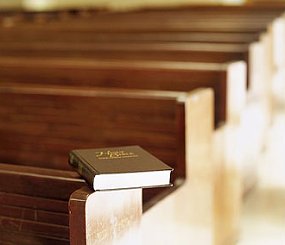In the previous segment of this mini-series, we left off with the Church grappling with the transition from the Information Age (and its emphasis on data and logic) to the Conceptual Age (with its emphasis on design and empathy.) The fundamental switch here aligns with the move from left-brained to right-brained thinking.
Where the Church gets steamrolled in this transition is that it's been stuck in the tar of left-brained mode for a couple hundred years. When the Enlightenment made it all about what we thought rather than did, the Western Church bought into living totally out of its left hemisphere. The result has been an entire group of people within society disenfranchised by the one group tasked with disenfranchising no one.
If we were honest with ourselves, we Christians of 2006 should question where all our creative types vanished to. How many Christians do we know who make their entire living as full-time artists, novelists, musicians, and actors? Compare that with how many Christians we know who are middle managers, accountants, engineers, or computer IT gurus.
Two hundred years ago, Christians not only created the art, they supported it. I would dare say that the vast majority of art in Christian households today is not only NOT created by Christians, it's barely passable as art. Our slide to the left brain over the right created a dearth of Christian artists and their lack left us stuck with whatever was most easily mass-marketed. The result? Today's Christians are too often the people responsible for much of the kitschy garbage passed off as "art" that we see today. A gut-check is needed here. Compare what hangs on the wall of your local museum with that of your local Christian bookstore. I don't think I'm stretching when I say the artistic output of today's Evangelicalism might represent the nadir of artistic expression in all of Christian history.
{Click on image to appreciate the full-sized horror of it all (pops)}
If we don't like the art that artists make today, we have our lack of patronage to blame for this, in part. Christian artists found the rising anti-art backlash in the Church meant that they could no longer afford to make a living as artists creating art solely for Christian crowds. As a result, Christian artists were stuck between putting food on the table selling art that appealed to secular crowds or starving to death trying to sell to an increasingly fickle Christian audience. Yes, many of them gave in to the prevailing nonsense that passes itself off as contemporary art today, but in the end we didn't support them and they had to eat. (Not trying to make excuses, just trying to point out reality.)
You know why the artist is different? Simple: he sees the world through a different part of his brain. Where the Church in America absolutely fumbled the Gospel here is that we automatically equated his different way of thinking with error. Not only that, but we painted (ugh!) the artist and all his friends as the very thing that is wrong with the world today. Strangely enough, he was thinking the same thing about us.
Now, as we enter 2006, we have an impasse. We decided we liked our churches stripped of anything that resembles art, good or otherwise. (I don't mean to pick on the Baptists here, but could there be anything more soul-anesthetizing than the architecture and interior decoration of your typical Baptist church of the last thirty years? Honestly, why can't our congregations inspire artists in their midst to create beautiful church art to offer up to God the artistic gifts He bestowed on those folks? It seems every kind of service is appreciated in our churches except the artistic.) The message to the artist was clear: your paintbrush is the devil's instrument.
Think what our churches would be like if we thought that everyone involved in the computer industry was creating the Beast's pathway. What if the engineers were building the antichrist's throneroom? And the accountants were only presiding over the one world money system and that infamous mark? Do you think that any of those left-brainers would hang around our congregations? Yet, in many cases, this is what happened to the right-brainers.
But guess what, left-brained Christians? Artists are the new power class in the Conceptual Age. You know, the bohemian with the soul patch. And guess what again? We drove his kind out of our churches with our total emphasis on left-brained thinking and our complete inability to appreciate what his right hemisphere (and his musical, empathic, theatrical, artist's bent) brought to our congregations.
But now that empathic artist is the one in charge. Left-brained Christians are gnashing their teeth over this. I see it every day. And the gnashing is only going to increase unless left-brained and right-brained Christians bury the hatchet—and not in each other. God created both left-brained and right-brained thinkers; it's about time the Church honored both.
In the next installment of this mini-series, we'll see how the Church needs to adapt to this cultural change and what it means for how we do ministry in 2006 and beyond.
Stay tuned!


 This is the sixth in a series of posts covering the hidden messages that sneak into American churches’ proclamation of the Gospel. For more background, please refer to
This is the sixth in a series of posts covering the hidden messages that sneak into American churches’ proclamation of the Gospel. For more background, please refer to  My hope is that the Church in this country will live up to the high calling for which the Lord offered Himself. I love the Church, else I wouldn't be doing any of this.
My hope is that the Church in this country will live up to the high calling for which the Lord offered Himself. I love the Church, else I wouldn't be doing any of this.